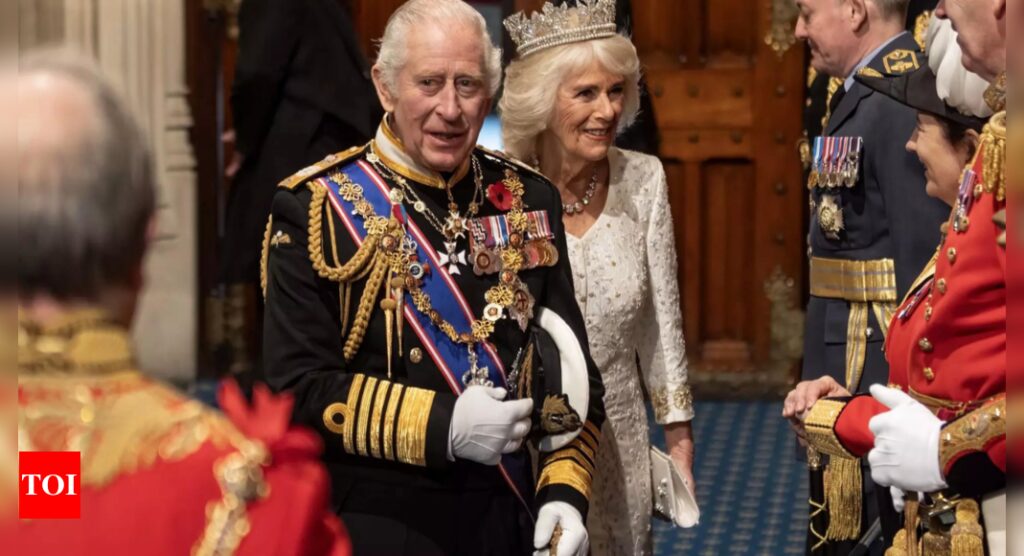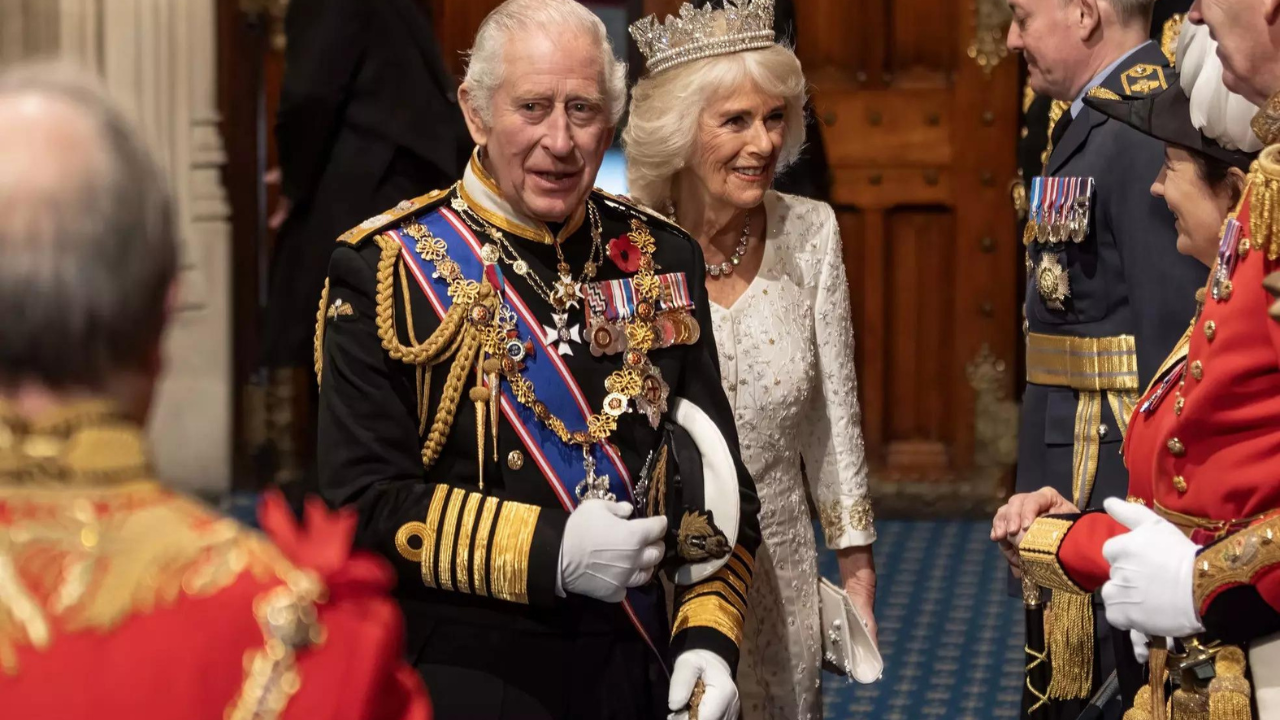[ad_1]
NEW DELHI: King Charles III in his first speech to open Parliament as King Charles III, the monarch adhered to tradition by outlining the British government’s legislative priorities, a task typically reserved for the Prime Minister. However, this year’s speech carried a particular twist, as it included policies at odds with King Charles’s personal beliefs.
Notably, it featured Prime Minister Rishi Sunak’s plan to expand oil and gas extraction in the North Sea, a decision met with opposition from climate change campaigners, a cause the king has long supported.
Despite his advocacy for climate action, King Charles maintained a neutral demeanor while delivering the “King’s Speech,” emphasizing protocol, royal regalia, and choreography over politics. The monarchy’s commitment to political neutrality, solidified during Queen Elizabeth’s reign, continues with King Charles, who followed a well-established ceremonial routine.
King Charles offered a brief tribute to his mother at the outset of his 10-minute speech. The government had already confirmed its plans to introduce annual oil and gas licensing rounds, departing from the previous periodic system.
The Conservatives, facing a significant decline in the polls, seek to create a political divide with the opposition Labour Party, which has committed to honoring existing North Sea licenses but not granting new ones if it comes to power. Downing Street asserted that its proposal aligns with the king’s climate change goals, as it believes utilizing British energy resources is a pragmatic approach to achieving net-zero targets without overburdening working families.
This speech is expected to be the last before the next general election, slated for January 2025, and is seen as an effort to solidify the government’s right-wing voter base.
Rishi Sunak’s reconsideration of climate policy came after his party’s success in a London parliamentary by-election, where they campaigned against a measure imposing higher charges for older, more polluting cars. This unexpected victory led to Sunak’s decision to weaken several environmental measures in September, including delaying the ban on the sale of gasoline and diesel cars by five years and lowering targets for replacing gas boilers.
On Tuesday, the government introduced legislation on crime to ensure that serious offenders remain in prison for longer and face their victims in court. Additionally, they unveiled legislation to gradually ban smoking, making it illegal to sell cigarettes to those born after January 2009, a measure previously mentioned by Sunak.
Last week, Buckingham Palace announced that King Charles would deliver an opening address at the COP 28 climate meeting scheduled to begin later this month in Dubai. However, Catherine Haddon noted that King Charles’s well-known stance on climate change might lead him to be more careful about appearing neutral.
(Via media inputs)
Notably, it featured Prime Minister Rishi Sunak’s plan to expand oil and gas extraction in the North Sea, a decision met with opposition from climate change campaigners, a cause the king has long supported.
Despite his advocacy for climate action, King Charles maintained a neutral demeanor while delivering the “King’s Speech,” emphasizing protocol, royal regalia, and choreography over politics. The monarchy’s commitment to political neutrality, solidified during Queen Elizabeth’s reign, continues with King Charles, who followed a well-established ceremonial routine.
King Charles offered a brief tribute to his mother at the outset of his 10-minute speech. The government had already confirmed its plans to introduce annual oil and gas licensing rounds, departing from the previous periodic system.
The Conservatives, facing a significant decline in the polls, seek to create a political divide with the opposition Labour Party, which has committed to honoring existing North Sea licenses but not granting new ones if it comes to power. Downing Street asserted that its proposal aligns with the king’s climate change goals, as it believes utilizing British energy resources is a pragmatic approach to achieving net-zero targets without overburdening working families.
This speech is expected to be the last before the next general election, slated for January 2025, and is seen as an effort to solidify the government’s right-wing voter base.
Rishi Sunak’s reconsideration of climate policy came after his party’s success in a London parliamentary by-election, where they campaigned against a measure imposing higher charges for older, more polluting cars. This unexpected victory led to Sunak’s decision to weaken several environmental measures in September, including delaying the ban on the sale of gasoline and diesel cars by five years and lowering targets for replacing gas boilers.
On Tuesday, the government introduced legislation on crime to ensure that serious offenders remain in prison for longer and face their victims in court. Additionally, they unveiled legislation to gradually ban smoking, making it illegal to sell cigarettes to those born after January 2009, a measure previously mentioned by Sunak.
Last week, Buckingham Palace announced that King Charles would deliver an opening address at the COP 28 climate meeting scheduled to begin later this month in Dubai. However, Catherine Haddon noted that King Charles’s well-known stance on climate change might lead him to be more careful about appearing neutral.
(Via media inputs)
[ad_2]
Source link











More Stories
We can’t wait to face India in the final: Pat Cummins | Cricket News
Railways plans 3,000 additional trains in next 4-5 years to minimise number of waitlisted tickets | India News
Faridabad: Man dies after ‘falling from hotel room window’ while partying with friends